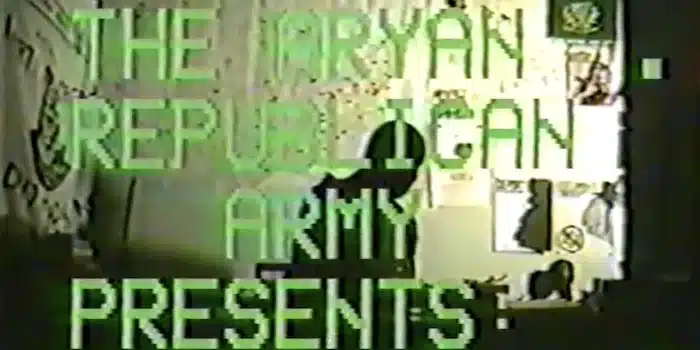“Robbing banks was never the point…Payback’s coming, and it’s coming sooner than you think,” said a Neo-Nazi bank robber named “Wild Bill” in Showtime’s Waco: The Aftermath, which premiered Friday.
Wild Bill’s statement was a foreshadowing of the Oklahoma City bombing. The new Showtime series tracks in dramatic fashion the time period from the April 19, 1993, Waco massacre to the OKC bombing exactly two years later.
So what did a character named Wild Bill have to do with the deadliest terrorist attack in American history? According to the FBI, Timothy McVeigh acted alone when he murdered at least 168 people, including 19 children, on April 19, 1995—receiving only minor assistance in assembling the bomb from accomplices Terry Nichols and Michael Fortier.
Is Showtime promoting disinformation? Or even worse: a conspiracy theory?
To the contrary, Waco: The Aftermath’s portrayal of the OKC bombing plot is far more accurate than the FBI’s “official” story. Though the show takes creative license—for example, it depicts Wild Bill in a hostage scenario, which never happened—its characters are based on real people involved in the attack.
Indeed, the show’s Wild Bill character is modeled after Richard Lee Guthrie, the cofounder of the Aryan Republican Army. Guthrie, along with his fellow ARA leader Peter Langan—a colorful character who recently became the first federal inmate in history to receive a sex change, as exclusively reported by Headline USA—teamed up to create the most prolific group of bank robbers of the 1990s.
Utah attorney Jesse Trentadue provided Headline USA with an ARA recruitment video. Trentadue has been suing the FBI for decades because the U.S. government murdered his brother in an Oklahoma prison—an act Trentadue believes was prompted by the fact that agents mistook his brother for an ARA member.
When Guthrie and Langan were arrested for their bank robberies in 1996, observers couldn’t help but wonder if the ARA was somehow linked to the OKC bombing.
After all, the FBI was still hunting for “John Doe 2,” a mysterious accomplice seen by dozens of witnesses with McVeigh on the morning of the attack. Moreover, the Aryan robbers’ mission was to use the proceeds of their heists to fund right-wing terrorist attacks—and someone must have been funding McVeigh, who had been a member of the KKK, as he roamed across America throughout the early ‘90s.
Intrigue about the ARA heightened even further when it was revealed that McVeigh had placed a phone call days before the April 19 attack to Elohim City—a white supremacist compound in the Ozarks that ARA members had used as a hideout.
The link was so obvious that national outlets such as The Washington Post questioned it when covering Langan’s trial.
“One of the enduring mysteries of the Oklahoma City bombing investigation is why, two weeks before the blast, Tim McVeigh placed a 1-minute 46-second phone call to Elohim City. Whom was he calling?” the Post asked in February 1997.
However, the Post failed to pursue that lead, concluding in the same article that “there is no proof that McVeigh knew the Aryan robbers.”
But in the years after the OKC bombing and the 1997 ARA bank-robbery trial, evidence would continue to mount that the two were connected.
In 2001, then-Indiana State University criminologist Mark Hamm published a book making the case that the ARA helped carry out the bombing. Hamm’s In Bad Company: America’s Terrorist Underground detailed the movements of McVeigh and the ARA throughout 1993 and ’94, showing that the bomber was often in Arizona, Kansas and Oklahoma at the same time as Langan, Guthrie and the other ARA members.
“It is highly improbable—if not statistically impossible—for nine men with such violent predispositions and such deep connections within the white power movement…to randomly come together at the same time in the same geographical area,” Hamm concluded, referring to McVeigh, Nichols, Guthrie, Langan and five other Aryan members.
Hamm also identified a plausible reason for why the FBI hasn’t prosecuted ARA members for their role in the OKC bombing: Langan, it turns out, was a Secret Service informant who went rogue. As Hamm noted, revealing that its own informant participated in the attack would have cost many people in the federal government their jobs—at the very least.
Even more shocking, Trentadue later uncovered evidence that the ARA may even have been an FBI front group. Trentadue obtained an email from former FBI agent Don Jarrett—who investigated right-wing terrorism in the 1990s—saying that the Aryan robbers were thoroughly infiltrated by FBI informants.
Former FBI agents who investigated the OKC bombing have also linked the ARA to McVeigh. Danny Coulson, who headed the FBI’s hostage rescue team and worked on the OKC case, recently said that McVeigh had, in fact, visited the ARA’s hideout at Elohim City—debunking the Post’s earlier claim that there was “no proof” linking the two. Coulson has publicly called for the case to be reopened.
However, the FBI’s coverup continues to this day.
Trentadue, who has provided Headline USA with numerous records about FBI corruption, said he hopes the new Showtime series will stoke renewed interest in the real story of the Oklahoma City bombing.
Showtime is set to release the second episode of Waco: The Aftermath on Friday.
This article was originally featured at Headline USA and is republished with permission.

































